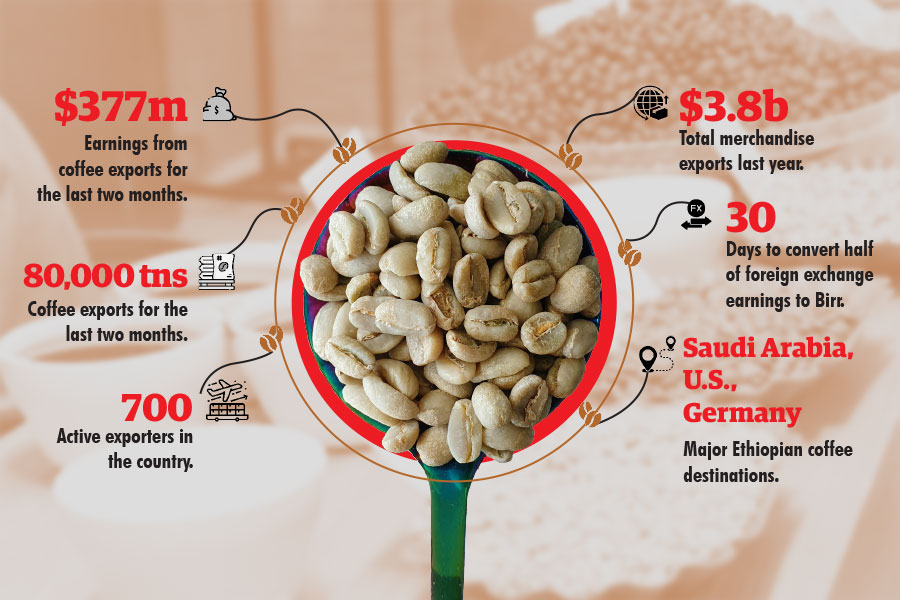
Fortune News | Aug 30,2025
Nov 18 , 2023
By Selome Getachew
The coffee sector faces a critical juncture with stranded and unexported beans remaining large in volume. A drastic shift from the historical market performance, coffee exporters are confronted with a surplus of unexported coffee. Sky-high cherry prices have left the market in a lurch as new regulations and loan restrictions reshape the coffee landscape, writes Selome Getachew (sol_get@yahoo.com), a James Madison University certified manager and a founding managing director of Bridge Investment Consultancy.
Ethiopia holds a special place in the annals of global coffee production. Acclaimed as the birthplace of the cherished bean, it has built a reputation for producing some of the finest coffee in the world. Characterised by its rich traditions and historical significance in the coffee market, the country is the fifth-largest producer globally. Yet, as the current fiscal year unfolds, Ethiopia faces a daunting predicament that threatens to undermine the very foundation of its coffee industry.
The recent turmoil in the coffee market illuminates the delicate balance between domestic interests and international trade dynamics. This year, approximately 80,000tn of coffee remained unexported, an evident departure from the usual performance in the global market. The root cause of this disruption lies in the domestic market dynamics, particularly the inflated cherry prices that discouraged exporters. They had previously purchased red cherries at exorbitant rates, soaring between 80 Br to 90 Br a kilogram.
This strategy, however, backfired, leading to a glut in the market and subsequent losses for both the exporters and the national economy.
As the new crop year began, the scenario altered. Competition among exporters for cherry purchases was notably less fierce than the previous year. The change was partly due to many exporters still keeping unsold stocks from the prior year, coupled with diminished export opportunities. Compounding this situation was the introduction of new regulations by the National Bank of Ethiopia (NBE), which restricted access to loans, thus squeezing the liquidity available to companies.
The series of events led to a relative stabilisation in cherry prices at the onset of the year, with prices beginning at 25 Br for a kilo in some regions and 30 Br in the Oromia Regional State, a significant contributor to Ethiopia's coffee output.
However, a recent development has added a new twist to this unfolding drama. The issuance of a circular letter by the "Oromia Gebeya Limat" mandated farmers to sell their cherries within the price range of 45 Br 50 Br, markedly higher than the previous range of 30 Br to 35 Br for a kilo. This directive, along with the closure of certain stations under the pretext of providing farmers with an additional 10 to 20 Br, has raised concerns about a potential repeat of last year's pricing debacle.
The federal government faces a complex task in balancing the interests of farmers and the broader coffee production ecosystem. Ensuring that any measures to support farmers are well-considered and inclusive is crucial. As seen in other coffee-producing countries, misguided incentives or subsidies could disrupt the entire coffee transaction chain.
A case in point is Vietnam's coffee industry, which has witnessed phenomenal growth, defying the global price regimes that often dictate prices in other coffee-producing countries. According to FAOSTAT, Vietnam's coffee production soared from 92,000tn in 1990 to an impressive 1.6 million tonnes in 2019. This growth trajectory sharply contrasts with the decline observed in African coffee producers like Ethiopia and Kenya.
Vietnam's success can be attributed to its government's proactive role in the coffee sector. The World Bank acknowledged its sweeping involvement across the coffee value chain, from input and credit markets to policy and regulatory frameworks. This involvement included land allocation laws, price stabilisation measures, and incentives that boosted farmers' productivity. The latter contains preferential credit for growers and exporters, export bonuses, and government programs that facilitated land access and provided technology, extension services, and financial support.
Ethiopia can draw valuable lessons from Vietnam's approach to reviving its coffee sector. Forcing farmers to sell their products at inflated prices under unfavourable market conditions cannot be one of them. It could lead to an overstock crisis, mirroring last year's experience. Rather than resorting to reactive measures, policymakers need to focus on sustainable, long-term solutions that balance local needs with global market dynamics.
PUBLISHED ON
Nov 18,2023 [ VOL
24 , NO
1229]


Fortune News | Aug 30,2025

Radar | Apr 08,2023

Radar | Jul 21,2024

Fortune News | Aug 06,2022

Radar | May 20,2023

Fortune News | Oct 13,2024

Radar | Jan 19,2019

Commentaries | Jun 18,2022

Radar | May 18,2024

Advertorials | Apr 08,2024

Photo Gallery | 169781 Views | May 06,2019

Photo Gallery | 160028 Views | Apr 26,2019

Photo Gallery | 149609 Views | Oct 06,2021

My Opinion | 136208 Views | Aug 14,2021





Dec 22 , 2024 . By TIZITA SHEWAFERAW
Charged with transforming colossal state-owned enterprises into modern and competitiv...

Aug 18 , 2024 . By AKSAH ITALO
Although predictable Yonas Zerihun's job in the ride-hailing service is not immune to...

Jul 28 , 2024 . By TIZITA SHEWAFERAW
Unhabitual, perhaps too many, Samuel Gebreyohannes, 38, used to occasionally enjoy a couple of beers at breakfast. However, he recently swit...

Jul 13 , 2024 . By AKSAH ITALO
Investors who rely on tractors, trucks, and field vehicles for commuting, transporting commodities, and f...

Oct 4 , 2025
Eyob Tekalegn (PhD) had been in the Governor's chair for only weeks when, on Septembe...

Sep 27 , 2025
Four years into an experiment with “shock therapy” in education, the national moo...

Sep 20 , 2025
Getachew Reda's return to the national stage was always going to stir attention. Once...

Sep 13 , 2025
At its launch in Nairobi two years ago, the Africa Climate Summit was billed as the f...

Oct 5 , 2025 . By NAHOM AYELE
In Meqelle, a name long associated with industrial grit and regional pride is undergo...

Oct 5 , 2025 . By BEZAWIT HULUAGER
The federal government is set to roll out a new "motor vehicle circulation tax" in th...

Oct 5 , 2025 . By NAHOM AYELE
The Bank of Abyssinia is wrestling with the loss of a prime plot of land once leased...

Oct 5 , 2025 . By BEZAWIT HULUAGER
The Customs Commission has introduced new tariffs on a wide range of imported goods i...